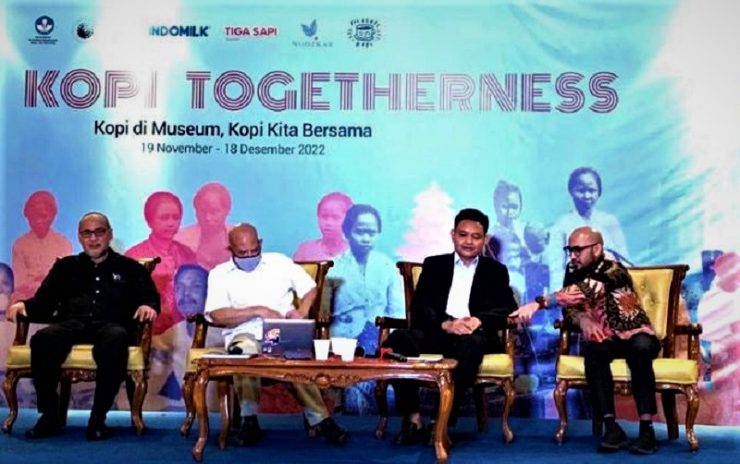THE NATIONAL Museum in collaboration with coffee curator Daroe Handoyo, CEO of Nooskav Coffee held a talk about coffee diplomacy. The event presented several senior diplomats, the Head of the Indonesian Representative Office, Ministry of Foreign Affairs officials and coffee activists which was held on December 14 2022 and received enthusiasm from the audience both online and offline.
In his opening speech, the Indonesian Ambassador to Qatar, Ridwan Hassan explained that throughout 2023, Indonesia will become a partner country for organizing the Qatar Year of Culture. In this event, Indonesia and Qatar will mutually promote the cultural richness of each country.
“The program of events in this exhibition presents a series of information to the public that offers knowledge, recreation and celebration of Indonesian coffee with a community network of coffee producers, activists and fans by exploring the various relationships between Indonesian people and coffee,” said Ridwan Hassan.
It was stated that this was an opportunity and a showcase for Indonesian coffee that needs to be known not only to the Qatari public, but also the Middle East. “Qatar imports coffee from Indonesia for only US$740,000 per year. Of course, with Indonesia’s diplomacy and best practices in other countries, this trade situation can be improved to become more profitable for Indonesia.
The Ministry of Foreign Affairs and all Indonesian Representatives abroad have carried out various promotions for Indonesian coffee products with a focus on specialty coffee. For this reason, it is necessary to search for potential markets to promote coffee (niche market).
So did Robby Wattimena, the Diplomat of the Ministry of Foreign Affairs explained about a digital platform called Indonesia-Latin America and the Caribbean (INA LAC). It was officially launched by the Minister of Foreign Affairs of the Republic of Indonesia in 2020 and given the great interest and high utilization of the INA-LAC platform, the Ministry of Foreign Affairs developed the platform to be wider from the South America and Caribbean Region to the Americas and Europe Region.
“The INA Access Platform is a shared platform and can be used by all parties related to the promotion of trade, investment and tourism. Business actors (exhibitors) can join for free without any fees. The presence of the INA-ACCESS Platform seeks to create opportunities for users of Indonesian business actors and the Amerop Region. The INA-Europa Forum business has generated a business value of US$6.8 million. For the Central and Eastern European Indonesian Business Forum (INA-CEE) it generates US$3.1 million,” he said.
Meanwhile Bagas Hapsoro, former Ambassador to Sweden and Lebanon said that coffee diplomacy defends the interests of the people. Diplomacy is an activity that carries and fights for the interests of the people and the state. This method is carried out by representing, protecting, approaching, negotiating, promoting, reporting and enhancing cooperative relations.
Coffee is part of economic diplomacy. There is an element of trade, export, etc. Coffee also has a strategic position in culture, for example brewed coffee. Considering that coffee is an important part of the ecosystem, the environment also needs to be protected.
According to Bagas, this must be maintained and fought for by diplomats. He reminded that currently many countries are doing harm to Indonesian export products. Importing countries such as the European Union continue to make rules that hinder our coffee exports based on new policies, including “anti-deforestation”.
In facing these obstacles, the Indonesian delegation at the World Trade Organization (WTO) also put up a fight. Even on the issue of deforestation, Indonesia consistently fights back. The policies carried out by Indonesia do not violate international provisions, in fact they are in accordance with the SDG (UN Sustainable Development Goals) principles.
The last speaker, Djumantoro Purbo, former Indonesian Ambassador to Slovakia, stated the need for knowledge in the field of culture and local wisdom. Coffee does not only have economic value but also socio-cultural value. The coffee consumption trend will last a long time because it is rooted in culture. From the course of the discussion it was concluded that the excellent cooperation between upstream and downstream stakeholders including coffee players could still be improved.
Several innovative methods will continue to be applied in coffee diplomacy, including business matching, the INA Access platform, digital solutions, traceability and e-commerce access. This should be followed by domestic research and development, such as education for farmers, training and so on. [traveltext.id]
















